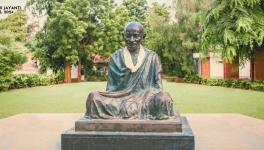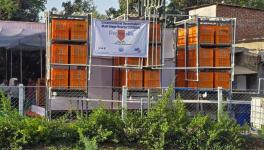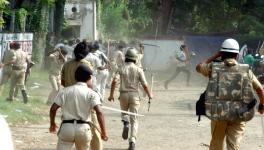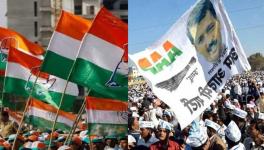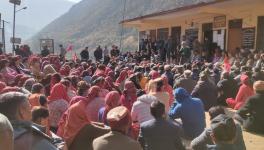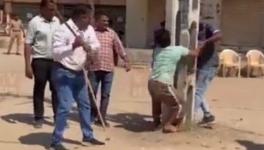People Worried Over Land Acquisition for Surat Metro as Regulatory Law Stands Diluted
Ahmedabad: The Gujarat Metro Railway Corporation (GMRC) is expected to begin work for the first phase of Surat Metro Rail project, which is estimated to cost Rs 12,020 crore and stretch 46.35 kilometres through the city.
This has raised concerns among people as the law on land acquisition-related compensation and rehabilitation has been substantially amended in the state.
Reportedly, 700 private properties are expected to be acquired by GMRC for which the Rehabilitation and Resettlement cost is estimated to be Rs 200 crore. Among the 700 properties, there are 120 residences and several commercial structures including 48 shops at a busy textile market.
The first phase, stretching across 21.61 kilometres, will connect the city from north to south by linking Sarthana area to Dream City.
As much as 16,500 square metres of the total 5,43,043 square-metre land to be acquired for the complete the Metro project is private land and parts of this land pass through densely populated areas between Bhesan, Saroli, Sarthana and Dream City areas of Surat.
“The GMRC is yet to send notices to people whose properties are to be acquired. But we have begun talking to some people who we think might lose their property to the project,” Krishnakant Chouhan, a Surat-based land and environment rights activist, told Newsclick.
“GMRC will pay compensation as per Right to Fair Compensation and Transparency in Land Acquisition Act, Rehabilitation and Resettlement Act, 2013. But in Gujarat, the act has been diluted to eliminate the social impact assessment clause. So, we are apprehensive of the process of the rehabilitation of the people who will lose their property or livelihood. Besides, GMRC has not released any public document yet; there are many aspects of the project that is vague,” added Chauhan.
Dilution of Law
In 2016, the Bharatiya Janata Party (BJP) government, led by the then Chief Minister Anandiben Patel, had passed a Bill in State Assembly amending the Right to Fair Compensation and Transparency in Land Acquisition Act, Rehabilitation and Resettlement Act. Later, it was approved by the President.
The Central Act states that without prior consent of at least 80% of the farmers or landowners who are going to be affected because of a project, land cannot be acquired.
The Central Act also gives the state government liberty to amend the legislation but only for the purpose of adding value and providing more benefits of land acquisition than already provided in the existing law.
The Gujarat government, in its amendment to the Act, eliminated the clause of social impact assessment, rehabilitation and resettlement for projects related to defence and social sectors, such as air base, roads, canals, railways and affordable houses etc.
The ruling BJP party also did away with the social impact assessment for the land to be acquired for industrial corridors and eliminated the consent clause put in by the previous Congress-led e Progressive Alliance government in the Central Act.
Notably, the Bill proposing the amendment to the Right to Fair Compensation and Transparency in Land Acquisition Act, Rehabilitation and Resettlement Act was passed in the Gujarat Assembly on the last day of the budget session when opposition Congress MLAs were under suspension for two days.
Explaining the rationale behind proposing the amendments, then state Health Minister and in-charge of revenue portfolio, Nitin Patel, had said that it would take too much time for land acquisition for any project if the current Act was followed as it was.
Jantri rate not revised since the year 2012
The Annual Statement of Rates (ASR) or jantri rate of land has not been revised since 2012 in Gujarat. In every government project where land is acquired from farmers or landowners, the value of compensation is paid as per the jantri rates of 2012, which is less than the current market rates of land.
In 2018, Comptroller and Auditor General of India (CAG), in its report on the revenue sector for 2016-2017, which was tabled in the Assembly, indicted the Gujarat government’s Revenue Department for not revising the ASR or jantri rate in five years and stated that it was resulting in loss of opportunity to generate revenue.
The CAG, while raising questions over the ASR of 2011, called the rates “unrealistic” and stated that the “government may formulate a sound scientific valuation to estimate property value with specific, streamline procedures.”
Meanwhile, farmers and land owners who have lost or will lose land in various government projects have been demanding that the compensation be calculated as per a revised jantri rate or current market rate.
History of Land Acquisition in Gujarat
Gujarat has a history of rampant land acquisition for industrialisation and urbanisation. South Gujarat is said to be one of the most exploited parts of the state in terms of land grab. In a stretch of about 280 kilometres between Surat and Mumbai, land has been acquired for multiple projects like freight corridor, bullet train, National Highway 8, various GIDC (Gujarat Industrial Development Corridor), and pipeline laying by Reliance and ONGC.
Farmers from multiple districts of South Gujarat have been protesting and fighting a legal battle against alleged land grab for the bullet train project and a freight corridor that will pass through extremely fertile mango and chiku orchards, schools, cemeteries, and even through villages while displacing entire populations.
In October 2016, a group of over 50 farmers from Surat had fought and lost a case against Reliance Industries, which had acquired land to transport gas from the Krishna Godavari basin to Gujarat. The Supreme Court had dismissed the farmers’ plea for higher compensation.
The same year, the Ministry of Road Transport and Highways initiated acquisition of 111 hectares of land between Maharashtra and Gujarat for the 380-km-long Ahmedabad-Vadodara- Mumbai expressway amid protests by farmers and landowners.
In 2017, the Union cabinet approved a proposal to transfer 4.64 hectares that belonged to the Indian Institute of Soil and Water Conservation Research Centre in Anand in central Gujarat to upgrade the Ahmedabad – Vadodara highway to six lanes.
Apart from this, in Saurashtra region of Gujarat, farmers from12 villages in Bhavnagar are fighting a legal battle against Gujarat Thermal Power Limited. On the other side, farmers in Jamnagar have been protesting and fighting a legal battle against land acquisition by Reliance Industries for years. In central Gujarat region, farmers have been protesting and refused to let go of their land for various projects in Anand, Nadiad and Vadodara.
Get the latest reports & analysis with people's perspective on Protests, movements & deep analytical videos, discussions of the current affairs in your Telegram app. Subscribe to NewsClick's Telegram channel & get Real-Time updates on stories, as they get published on our website.









